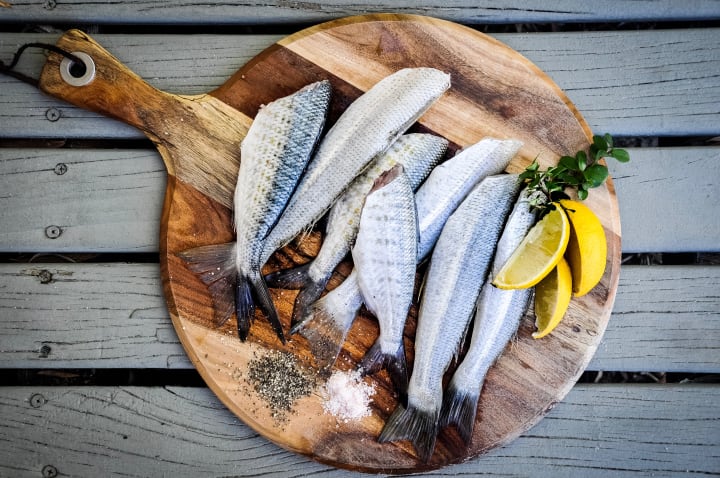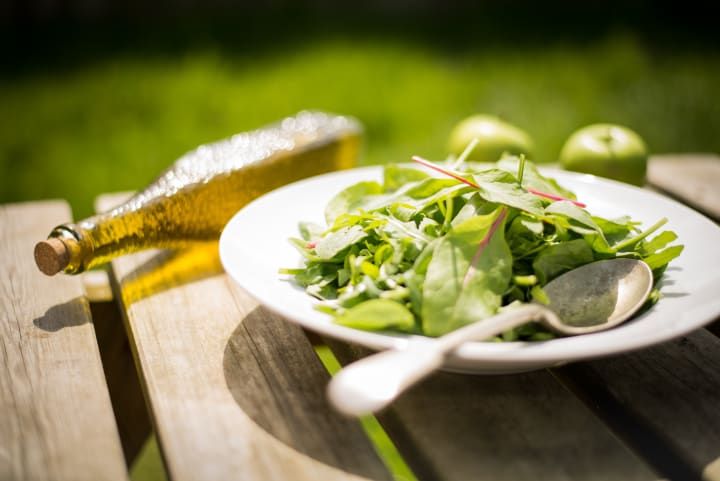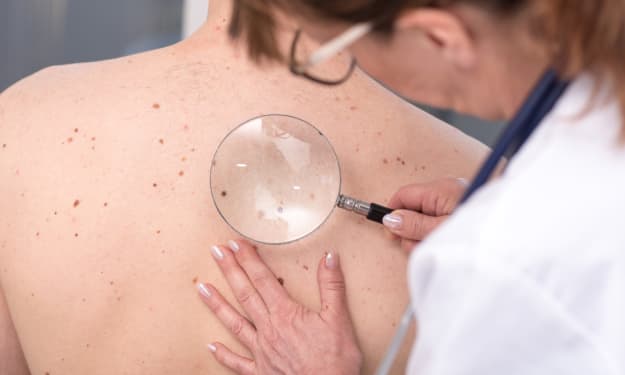How To Protect Your Skin From the Sun Naturally
We all know we ought to wear sunscreen. But that's not the only thing you can be doing to protect your skin from the sun naturally.

Sunburns, rashes, wrinkles, and, of course, skin cancer are all potential dangers of getting too much sun with too little protection. One important thing to do to avoid all this and more is applying sunscreen. You may know how to reduce sun damage after a sunburn, but there are many things you can do to protect your skin from the sun naturally and stave off any harmful effects of UV rays. Because while you want to avoid these dangers, you don't want to avoid the sun: it provides necessary things like vitamin D, as well as the warmth and light to have fun outdoors. Up your skincare routine, and take good care of your skin year-round so you don't have to hide. A diet rich in antioxidants, as well as other topically applied substances, can drastically reduce your risk of side effects from sun exposure.
Omega-3 Fatty Acids

Photo by Jeremy Stewart on Unsplash
You've probably heard that the Mediterranean diet is by far one of the healthiest, and has been linked to significant increases in life expectancy. There are a lot of factors that contribute to this difference in longevity, including their relatively lower consumption of red meat. But scientists widely agree that one of the most important takeaways from the longevity of Mediterranean people is the importance of Omega-3 fatty acids, which are found in foods like olive oil and fish (staples of the Mediterranean diet). Many scientists and doctors now recommend that you should try to get a minimum of 500mg of Omega-3 each day, but that more is probably better. This has incredible long-term effects on cognitive function, as well as a significant role in preventing cells from mutating and forming cancerous tumors after sun exposure.
Proanthocyanidins

Photo by Roberta Sorge on Unsplash
Sure, you can rescue your face from sun damage using these 4 Sephora products, or you can drink wine. That's right, drinking red wine can actually help your body protect itself from cancer. To be more specific, red wine, grapes, cranberries, and blackberries all contain oligomers called proanthocyanidins, which are very powerful antioxidants. These antioxidants are actually one of the most effective ways to protect your skin from the sun naturally. First, by ingesting plenty of foods rich in proanthocyanidins you provide your body with powerful free radical scavengers, which in turn prevent the dangerous mutations that lead to cancer. But it's not just by diet that they can help you; topical application has been shown to provide extra protection from dangerous UV radiation.
Beta-Carotene

Photo by Jonathan Pielmayer on Unsplash
Most of us probably have at least some memory of being told to eat our carrots so we can have good eyesight (or, in somewhat more aggressive families, to eat your carrots or you'll go blind). It's not an old wives' tale– carrots are extremely high in beta-carotene, an antioxidant that is processed into vitamin A in the body. Vitamin A is crucial for the health of your hair, nails, eyes, and yes, skin. In fact, having a healthy diet that includes beta-carotene rich foods is one of the best ways to protect your skin from the sun naturally. By maintaining a diet rich in these vegetables you provide your skin with a base layer of protection from free radical damage that can skin cancer from sun exposure.
Lycopene

Photo by Anda Ambrosini on Unsplash
While many studies regarding UV protection are relatively new and ultimately inconclusive, the scientific literature does indicate that certain powerful antioxidants help protect your skin from the sun naturally by fighting off free radical damag that can cause cancers and even wrinkles. One of these antioxidants is lycopene, which you can get by eating plenty of tomatoes, watermelon, grapefruit, asparagus, and a few other fruits and vegetables. By ingesting this antioxidant, you provide your body with a powerful tool against the damaging effects of UV rays in the long-term, like the development of melanomas, but also in the short term, as they seem to be able to reduce even the immediate risk of sunburns from extensive exposure to the sun.
Decreased Exposure

Photo by Aldo Terrazas on Unsplash
It is, of course, obvious that staying out of the sun is the best way to avoid UV-related concerns like cancer and wrinkles. The point of most of the things on this list is to find ways to help your body protect itself, even after sun exposure. But it should also be mentioned that if you do choose to limit your sun exposure as much as possible– by staying indoors, or seeking shade at any sunny outings– you should be sure to find alternative ways to get a sufficient amount of vitamin D. You want to make sure to get enough sun to absorb some vitamin D, but you can also include foods rich in this vitamin in order to round out your intake. Such foods include fatty fish, many dairy products like cow's milk and cheese, and any products that are fortified with vitamin D– a common practice for things like soy milk and orange juice.
Green Tea

Photo by Lex Sirikiat on Unsplash
Next to following a Mediterranean diet, one of the most significant lifestyle changes that may help prevent cancer and other sun-related complications is drinking plenty of green tea. This is because green tea is a concentrated source of Epigallocatechin gallate, or ECGC. ECGC works much like any other antioxidant in its ability to protect your skin from the sun naturally. Long-term effects of drinking green tea can be very significant, including a markedly reduced risk of many different kinds of cancer (including melanomas), and even some protection against wrinkles or brown spots, some of the other side effects of getting too much sun.
Astaxanthin

Photo by Jaleel Akbash on Unsplash
Astaxanthin is an antioxidant, like most of the products on this list, but it is one of the most powerful antioxidants, and protects your skin from the sun naturally not just by fighting cancer-causing free radicals, but by directly absorbing the UV radiation when applied topically. At its core, astaxanthin is a pigment found in algae, and its primary role is to absorb these rays. When ingested by way of foods like lobster and other red seafoods, it actually has promising effects for Alzheimer's and Parkinson's patients. But when applied topically, it provides a layer of protection from the sun, and is even used as or in certain sunscreens due to its effectiveness in this role.
Applying the Right Oils

Photo by Jonas Dücker on Unsplash
You don't have to rub vegetable oil on your body in place of sunscreen, but some healthy oils can actually protect your skin from the sun naturally by blocking as much as 20% of the UV radiation that reaches you. The main oils that can are natural sunscreens are olive oil and coconut oil, which both contain powerful antioxidants that provide some protection from long term sun damage. Now, it's important to note that this is not a great replacement for real sunscreen on its own– it would comparatively be about an SPF 5, while the minimum sunscreen you would buy in a store is SPF 15, and those with fair skin generally opt for much higher protection like SPF 40 or 60. However, if you're not planning to be in the direct sunlight for too long, using coconut oil provides the triple benefit of protecting your skin, moisturizing it, and smelling extremely nice. And while we're talking about coconuts, don't forget about the benefits coconut water has on your skin either!
Vitamin E

Photo by Mike Kenneally on Unsplash
Most chapsticks that advertise themselves as sun blocking work by way of vitamin E, another antioxidant that protects your skin from sun damage. It is also widely believed to help prevent and reduce wrinkles, which is another major effect of getting too much sun. For long-term effects, include vitamin E-rich foods like spinach, vegetable oils, and avocado in your diet. For more immediate protection, you can apply it directly to the skin for some added sun protection, where it will help to counteract the effects of free radicals caused by exposure to UV radiation. In fact, adding a topical application of vitamin E to your daily skin care routine has been shown to reduce wrinkles and provide an improvement in skin texture over time, sun or no sun.
Vitamin C

Photo by Edgar Castrejon on Unsplash
We all know that vitamin C is a huge help to our immune system, but that's not its only role. This vitamin also offers protection from the damaging effects of free radicals introduced by UV light, and as a result can prevent many kinds of cancers and growths. It can also help drastically reduce sunburns, which is very important for multiple reasons. First, of course, you want to prevent sunburns because they're uncomfortable and unsightly. But, more importantly, the damage to your skin that happens when it's burned by the sun greatly increases your risk of developing skin cancer. But you can take steps to avoid this by getting plenty of vitamin C every day, which can be found in citrus fruits, cruciferous veggies, or easily supplemented with any drugstore supplement.
About the Creator
Nicola P. Young
Lover of Books, Saxophone, Blogs, and Dogs. Not necessarily in that order. Book blogger at heartofinkandpaper.com.






Comments
There are no comments for this story
Be the first to respond and start the conversation.